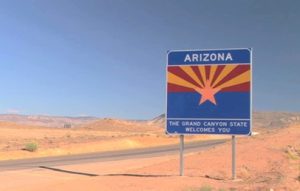A bill that would bring sports gambling to Arizona and give exclusive rights to Native American tribes has been put on the back burner.
On Jan. 23, 2019, three Arizona lawmakers including, Republican Sen. Sonny Borrelli, Rep. Leo Biasiucci (R) and Rep. Mark Finchem (R), introduced SB 1158. Under the proposed law, federally recognized tribes with a gaming compact would be authorized to operate sports betting at their land-based casinos in the state.
Not tribal lands only:
Currently, in Arizona, there are a total of 24 gambling facilities that are operated by 16 federally recognized tribes.
While the lucrative activity would be prohibited by others, regulated sports betting in the state would not be confined to tribal lands. The bill would reportedly allow for kiosks or similar devices to be installed inside of bars and other establishments that serve liquor, such as airport lounges and social clubs.
Industry regulation::
The industry would be overseen by the Arizona Department of Gaming, which would wield some discretion over its administration. Revenue tax would match neighboring Nevada’s sports betting rate, at a maximum rate of 6.75 percent.
However, according to Cronkite News via the Phoenix Business Journal, on February 7, 2019, the Commerce and Public Safety Committee removed the bill from the agenda for discussion at the Arizona Senate, because, said Borrelli, before any vote there needs to be amendments and revisions made.

Clause removal:
Borrelli said… “Unfortunately, I kind of put the cart before the horse.”
“I have to take the emergency clause off the bill to give the Department of Gaming enough time to come up with the rules to implement this game. No doubt they will kind of cut-and-paste what Nevada does, he explained.
Borrelli initially introduced the bill with an emergency clause, which would have required a two-thirds majority in both the House and the Senate and with the governor’s signature would have taken immediate effect. But, by removing the clause, only a majority of votes is needed and it would not be able to go into effect until the legislative session had been ended for 90 days.
Tribal contributions:
According to the Arizona Department of Gaming, under its current Tribal-State Compact, last year’s aggregate tribal contributions tallied approximately $107 million in the Grand Canyon state. Some $94 million or 88 percent of total contributions, were received by the Arizona Benefits Fund, which in addition to education, allocates monies for tourism, wildlife conservation and trauma and emergency services.
Rapid expansion:
To no one’s surprise, the appetite for legalized, state-regulated sports betting in the U.S. has escalated exponentially, with the May 14, 2018, U.S. Supreme Court decision overturning the federal ban spawning new laws in several states including Delaware, New Jersey, Pennsylvania, West Virginia and Rhode Island.
Currently, 18 states have taken action and have more than 40 bills on file. With the gambling trade group, the American Gaming Association (AGA), estimating that the U.S. has a $150 billion illegal sports betting market, that will undoubtedly increase.



